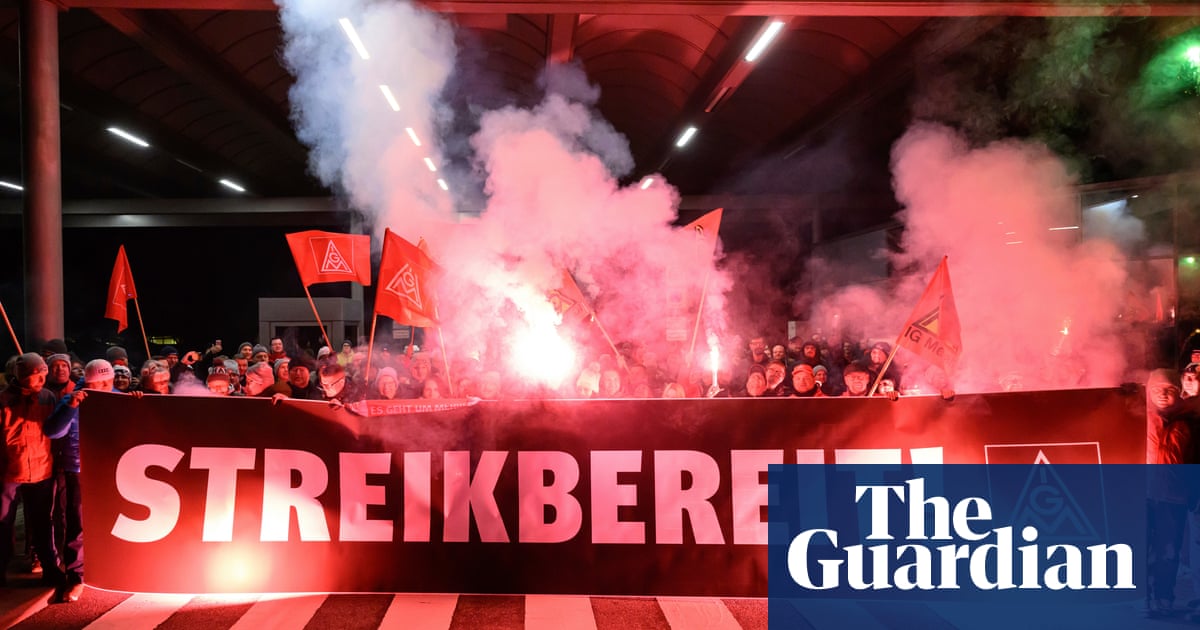[ad_1]
Workers at the Volkswagen factories in Germany will strike from Monday over the carmaker’s plans to cut thousands of jobs, cut wages and close plants for the first time in its home country.
Announcing that the “warning strikes”, which usually last several hours, will begin at all VW plants, Torsten Gröger, the lead negotiator of the IG Metall union with VW, said: “If necessary, this will be the toughest battle for collective contracting that Volkswagen has ever seen.”
The union leader accused VW managers of making the situation worse: “Volkswagen set fire to our collective agreements,” Groeger said.
VW’s plans yes close at least three plants — the first internal closings in the company’s 87-year history — laying off thousands of workers and cutting wages by 10 percent led to a bitter dispute with the union and works council.
The VW Group, which includes Audi and Porsche, is Germany’s largest employer with nearly 300,000 employees in the country, of which around 120,000 are covered by a collective agreement.
In a statement on Sunday, VW said it respected the right of employees to take part in a warning strike and had taken steps to minimize the impact.
The problems for the largest car manufacturer in Europe are an unpromising backdrop for Chancellor Olaf Scholz, who triggered a snap election last month when he fired his finance minister, ending Germany’s shaky three-party coalition government.
The Germans will vote on February 23 in an election that was supposed to make the opposition center-right CDU/CSU the largest group at the expense of Scholz’s Social Democrats. The campaign in the unusual winter election unfolds against the backdrop of crisis in Germany’s high-tech manufacturing sector and problems for the traditional hard-nosed German automakers.
VW is struggling with weak consumer demand, the costs of switching from internal combustion engines to electric vehicles and strong competition from China. The company cited slowing EV sales as a key reason for the deep cost cuts.
VW executives said the “deteriorating economic situation” required a “fundamental restructuring”, citing falling demand for cars in Europeplus higher labor, energy and raw material costs.
The union and works council presented plans that could save 1.5 billion euros in labor costs without the need to close factories. The plans include forgoing future wage increases in exchange for shorter hours at some plants and waiving bonuses for executives and staff.
Volkswagen responded that while the measures may help in the short term, they will not lead to “long-term financial relief for the company in the coming years.”
IG Metall said it was an “extremely regrettable” response, accusing the company of “ignoring the constructive suggestions of employee representatives”. The union warned of a “hot winter” of strikes.
The crisis for Europe’s biggest carmaker is emblematic of the problems for the industry across the continent. Last week, European Commission President Ursula von der Leyen, announced it will lead a “strategic dialogue” on the future of the European car industry. It faces pressure from center-right allies and the far right to repeal or weaken green targets for carmakers.
Automakers say they are struggling to finance investment to shift production from gasoline and diesel to electric vehicles, just as demand for battery-powered cars stalls. At the same time, electric car manufacturers in China – accused by the EU of being aided by “unfair” government subsidies – increase their market share.
VW announced in October that its profits are down nearly 60% amid declining sales in China. VW remains profitable, but pre-tax profit fell almost 60% to 2.4 billion. euros (£2bn) in the July to September quarter, down from £5.8bn. euro a year earlier.
[ad_2]
